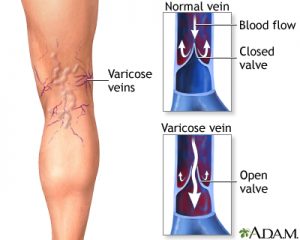It’s said that there are only two things in life that are truly inevitable, death and taxes. While it’s true that there’s virtually nothing in this life that is a 100 per cent guarantee, some things are much more likely than others, particularly when it comes to your health. You may have read that one of the most common causes of vein disease is genetics and you’re wondering – are varicose veins inevitable? Although some of us are more genetically prone, it doesn’t necessarily mean that it’s a guarantee you will develop them.
How to know if you’re at risk of varicose veins
One of the biggest myths about varicose veins is that they are inevitable as you age. While it’s true that those over 50 years old are more likely to develop them, the biggest factor that contributes to their development is genetics and how healthy your veins are.
Some of the common causes of varicose veins are:
- Genetics: If it’s on one side of the family your risk increases by up to 40 per cent, but if both parents have them, it can increase by up to 70 per cent.
- Age: As you get older, the valves in your veins can weaken.
- Sex: Women are almost twice more likely to develop varicose veins than men, in particular women who are overweight.
- Lifestyle: Smokers, people with fatty or high sugar diets as well as those who are seated or standing for extended periods of time are all at increased risk of varicose veins developing, as all these activities put a strain on the veins in the lower legs.
Are varicose veins inevitable?
When you look at all the elements that increase your risk of varicose veins it can be overwhelming. Although varicose veins themselves can’t be completely prevented, making some changes and developing healthy habits can reduce your risk. Here are a few tips on how to reduce those seemingly inevitable varicose veins.
Changes to diet
Making positive changes in your diet gives health benefits far beyond just vein health. To strengthen your vein health and lower your risk, cut down on trans and saturated fats, processed sugars and salty foods. Eat more plant-based foods like fruits, vegetables and leafy greens. In particular berries, apples, asparagus and other foods high in flavins.
Regular exercise
Regular exercise is important to maintain a healthy blood flow through the body. By building strength in the muscles and keeping your circulation constant, your veins are encouraged to keep working with a steady load, rather than blood pooling in the veins due to inactivity.
While you can make other lifestyle factors like quitting smoking, moving about while you’re at work etc, sometimes managing your veins needs some help. If you have a family history of veins, especially if it’s on both sides, speaking to your GP or a vein specialist is a good way to get an idea of how you can best take care of your veins, as well as have your risk factors assessed to know what best to do.
Learn more: What happens if varicose veins are ignored?
Seek expert advice
The doctors at The Vein Institute specialise in varicose vein treatment. We offer patients a comprehensive program using non-surgical laser treatment techniques. You can learn more in our Definitive Guide to Varicose Vein Treatment.
The benefits of non-surgical varicose vein treatment are:
- Walk-in walk-out treatment
- 98% success rate
- Extremely effective
- Can be performed at a clinic (no hospitalisation)
- No general anaesthetic
- Medicare rebates apply
- No downtime or time away from work
To book a consultation and discuss our treatment program, call 1300 981 402. Or, make an enquiry via the Contact Us page.
